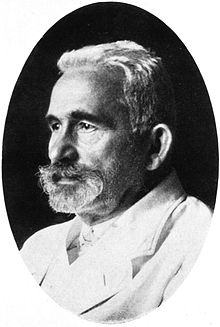Emil Kraepelin
| Emil Kraepelin | |
|---|---|

Emil Kraepelin in his later years
|
|
| Born |
15 February 1856 Neustrelitz, German Confederation |
| Died | 7 October 1926 (aged 70) Munich, Germany |
| Nationality | German |
| Fields | Psychiatry |
| Institutions |
University of Dorpat University of Heidelberg University of Munich |
| Alma mater |
Leipzig University University of Würzburg (MBBS, 1878) University of Munich (Dr. hab. med., 1882) |
| Thesis | The Place of Psychology in Psychiatry (1882) |
| Known for |
Classification of mental disorders, Kraepelinian dichotomy |
| Influences |
Wilhelm Wundt Bernhard von Gudden Karl Ludwig Kahlbaum |
| Influenced |
Diagnostic and Statistical Manual of Mental Disorders International Statistical Classification of Diseases and Related Health Problems |
| Spouse | Ina Marie Marie Wilhelmine Schwabe |
| Children | 2 sons, 6 daughters |
| Signature | |
Emil Kraepelin (German: [ˈeːmiːl ˈkʀɛːpəliːn]; 15 February 1856 – 7 October 1926) was a German psychiatrist. H. J. Eysenck's Encyclopedia of Psychology identifies him as the founder of modern scientific psychiatry, as well as of psychopharmacology and psychiatric genetics. Kraepelin was a strong and influential proponent of eugenics and racial hygiene, and believed the chief origin of psychiatric disease to be biological and genetic malfunction. His theories dominated psychiatry at the start of the 20th century and, despite the later psychodynamic influence of Sigmund Freud and his disciples, enjoyed a revival at century's end. While he proclaimed his own high clinical standards of gathering information "by means of expert analysis of individual cases", he also drew on reported observations of officials not trained in psychiatry. His textbooks do not contain detailed case histories of individuals but mosaiclike compilations of typical statements and behaviors from patients with a specific diagnosis. He has been described as a "scientific manager" and political operator, who developed a large-scale, clinically oriented, epidemiological research programme.
Kraepelin, whose father, Karl Wilhelm, was a former opera singer, music teacher, and later successful story teller, was born in 1856 in Neustrelitz, in the Duchy of Mecklenburg-Strelitz in Germany. He was first introduced to biology by his brother Karl, 10 years older and, later, the director of the Zoological Museum of Hamburg.
Kraepelin began his medical studies in 1874 at the University of Leipzig and completed them at the University of Würzburg (1877–78). At Leipzig, he studied neuropathology under Paul Flechsig and experimental psychology with Wilhelm Wundt. Kraepelin would be a disciple of Wundt and had a lifelong interest in experimental psychology based on his theories. While there, Kraepelin wrote a prize-winning essay, "The Influence of Acute Illness in the Causation of Mental Disorders". At Würzburg he completed his Rigorosum (roughly equivalent to an MBBS viva-voce examination) in March 1878, his Staatsexamen (licensing examination) in July 1878, and his Approbation (his license to practice medicine; roughly equivalent to an MBBS) on 9 August 1878. From August 1878 to 1882, he worked with Bernhard von Gudden at the University of Munich. Returning to the University of Leipzig in February 1882, he worked in Wilhelm Heinrich Erb's neurology clinic and in Wundt's psychopharmacology laboratory. He completed his Habilitation thesis at Leipzig; it was entitled "The Place of Psychology in Psychiatry". On 3 December 1883 he completed his Umhabilitierung (habilitation recognition procedure) at Munich.
...
Wikipedia
